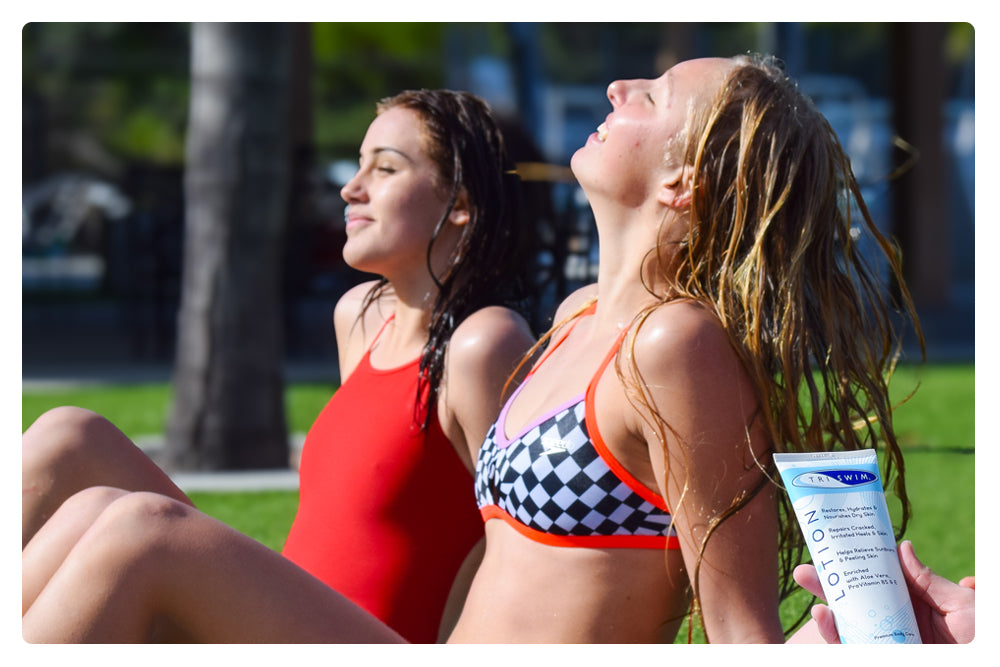
The Effects of Chlorine on Skin and Hair
With summer in full swing, many of us are diving into pools to beat the heat. While swimming is a fantastic way to stay cool and active, the chlorine used to keep pools clean can have some less-than-desirable effects on our skin and hair. Let’s explore how chlorine interacts with our bodies and what we can do to mitigate its impact.
What is Chlorine?
Chlorine is a powerful disinfectant commonly used in swimming pools to kill harmful bacteria and prevent the spread of waterborne illnesses. While it’s essential for maintaining pool hygiene, chlorine can be harsh on our skin and hair.
How Chlorine Affects the Skin
Dryness and Irritation: Chlorine strips away the natural oils that protect our skin, leading to dryness and irritation. This can cause itchiness, redness, and in severe cases, rashes.
Worsening Skin Conditions: For individuals with pre-existing skin conditions like eczema or psoriasis, chlorine exposure can exacerbate symptoms, leading to more severe flare-ups.
Chemical Sensitivity: Some people may develop sensitivity to chlorine, resulting in allergic reactions. Symptoms can include redness, swelling, and hives.
How Chlorine Affects the Hair
Dry and Brittle Hair: Similar to its effects on the skin, chlorine strips the hair of its natural oils, leading to dryness and brittleness. This can make hair more prone to breakage and split ends.
Discoloration: Chlorine can react with the minerals in our hair, particularly if it’s chemically treated or color-treated. This can result in a greenish tint, especially in blonde hair.
Loss of Shine and Elasticity: Healthy hair has a natural shine and elasticity, but chlorine exposure can diminish these qualities, leaving hair looking dull and feeling lifeless.
Tips to Protect Your Skin and Hair
-
Pre-Swim Rinse: Rinse off in the shower before entering the pool. Wetting your skin and hair with fresh water can reduce the amount of chlorine absorbed. For added protection, you may precondition- Since hair is like a sponge, the follicles will absorb the first thing it comes in contact with. Prior to swimming, coating the locks with TRISWIM Conditioner will help protect against chlorine absorption. Be sure to wear a swim cap. Shower with TRISWIM Shampoo and follow with TRISWIM Conditioner to ensure healthy hair.
-
Post-Swim Rinse: Shower immediately after swimming to wash away chlorine. Use TRISWIM Shampoo and moisturizing TRISWIM Conditioner to restore natural oils in your hair. Use a specifically formulated Body Wash on your skin for chlorine removal, such as TRISWIM Body Wash.
-
Moisturize: Apply TRISWIM Lotion to your skin after swimming to combat dryness.
-
Wear a Swim Cap: Protect your hair by wearing a swim cap. This can significantly reduce chlorine exposure.
-
Hydrate: Drinking plenty of water helps keep your skin hydrated from the inside out, counteracting the drying effects of chlorine.
Natural Remedies
-
Coconut Oil: Apply coconut oil to your hair before swimming. It acts as a barrier, preventing chlorine from penetrating the hair shaft.
-
Aloe Vera: Aloe vera gel can soothe and hydrate the skin after chlorine exposure. It’s especially helpful for those with sensitive skin.
-
Apple Cider Vinegar Rinse: An apple cider vinegar rinse can help remove chlorine buildup from your hair and restore its natural pH balance.
While chlorine is necessary for keeping pools safe and clean, it can take a toll on your skin and hair. By taking a few simple precautions, you can enjoy swimming without suffering from the drying and irritating effects of chlorine. This summer, make sure to protect your skin and hair so you can dive in and splash around worry-free.
Check out TRISWIM's full line of Chlorine Removal products in all sizes.
0 comments